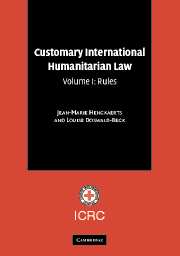Book contents
- Frontmatter
- Contents
- Foreword by ICRC President Jakob Kellenberger
- Foreword by Judge Abdul G. Koroma
- Foreword by Yves Sandoz
- Acknowledgements
- Introduction
- List of abbreviations
- Part I The Principle of Distinction
- Part II Specifically Protected Persons and Objects
- Part III Specific Methods of Warfare
- Part IV Weapons
- Part V Treatment of Civilians and Persons Hors De Combat
- Part VI Implementation
- Chapter 40 Compliance with International Humanitarian Law (Rules 139–143)
- Chapter 41 Enforcement of International Humanitarian Law (Rules 144–148)
- Chapter 42 Responsibility and Reparation (Rules 149–150)
- Chapter 43 Individual Responsibility (Rules 151–155)
Chapter 44 - War Crimes (Rules 156–161)
Published online by Cambridge University Press: 05 June 2012
- Frontmatter
- Contents
- Foreword by ICRC President Jakob Kellenberger
- Foreword by Judge Abdul G. Koroma
- Foreword by Yves Sandoz
- Acknowledgements
- Introduction
- List of abbreviations
- Part I The Principle of Distinction
- Part II Specifically Protected Persons and Objects
- Part III Specific Methods of Warfare
- Part IV Weapons
- Part V Treatment of Civilians and Persons Hors De Combat
- Part VI Implementation
- Chapter 40 Compliance with International Humanitarian Law (Rules 139–143)
- Chapter 41 Enforcement of International Humanitarian Law (Rules 144–148)
- Chapter 42 Responsibility and Reparation (Rules 149–150)
- Chapter 43 Individual Responsibility (Rules 151–155)
Summary
Rule 156. Serious violations of international humanitarian law constitute war crimes.
Practice
Volume II, Chapter 44, Section A.
Summary
State practice establishes this rule as a norm of customary international law applicable in both international and non-international armed conflicts.
International and non-international armed conflicts
The Statute of the International Criminal Court defines war crimes as, inter alia, “serious violations of the laws and customs applicable in international armed conflict” and “serious violations of the laws and customs applicable in an armed conflict not of an international character”. The Statutes of the International Criminal Tribunals for the Former Yugoslavia and for Rwanda and of the Special Court for Sierra Leone and UNTAET Regulation No. 2000/15 for East Timor also provide jurisdiction over “serious” violations of international humanitarian law. In the Delalić case in 2001, in interpreting Article 3 of the Statute of the International Criminal Tribunal for the Former Yugoslavia listing the violations of the laws or customs of war over which the Tribunal has jurisdiction, the Appeals Chamber stated that the expression “laws and customs of war” included all laws and customs of war in addition to those listed in the Article. The adjective “serious” in conjunction with “violations” is to be found in the military manuals and legislation of several States.
There is also practice which does not contain the adjective “serious” with respect to violations and which defines war crimes as any violation of the laws or customs of war.
- Type
- Chapter
- Information
- Customary International Humanitarian Law , pp. 568 - 621Publisher: Cambridge University PressPrint publication year: 2005



